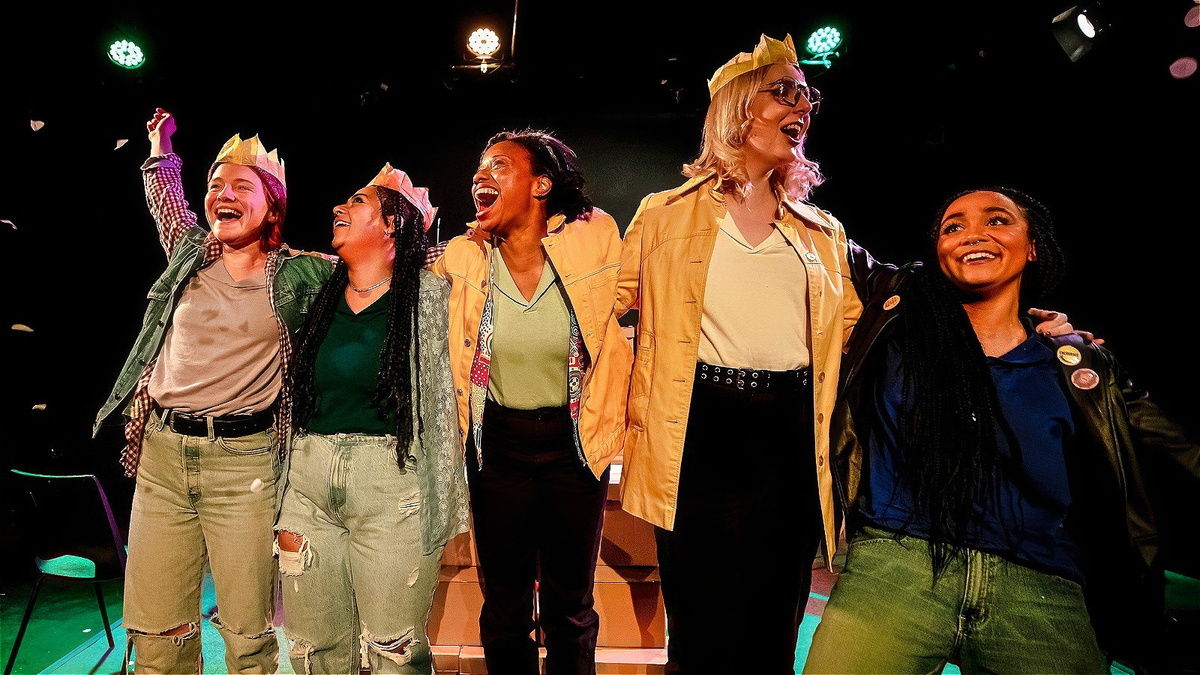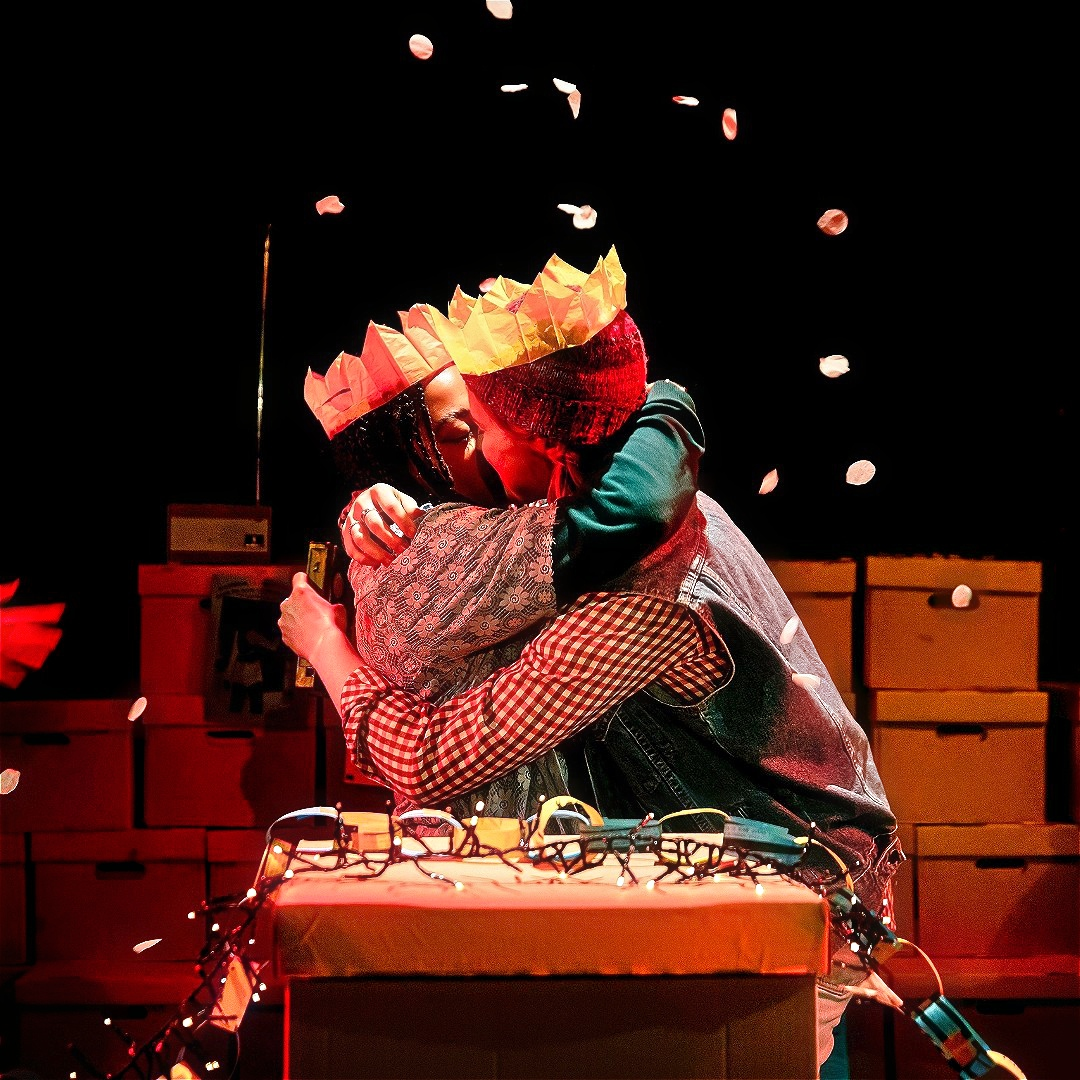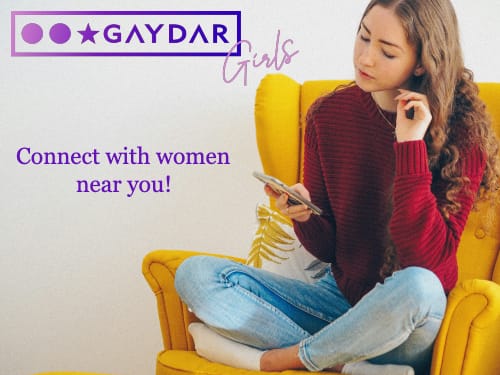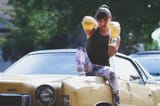What's on in London: Grills
Celebrating the history of the Camden Lesbian Centre and Black Lesbian Group.

On now at Camden People's Theatre in London is the production of Grills.
What's the context of Grills?
From 1987 to 1995, Euston was home to the Camden Lesbian Centre and Black Lesbian Group, the first and only of its kind.
Funding cuts closed the centre, then moved its archive 400 miles away to Glasgow.
What's Grills about?
Vall is doing some research on the Camden Lesbian Centre and Black Lesbian Group, a community centre that existed in the 80s and 90s in Camden. But first she has to go to Glasgow, where the archive is kept, 400 miles away.
There she meets fellow queer nerds Bee, Jaz and Mo. Together they delve into the archive and imagine the stories of the founding members of the CLC and BLG, taking us back to the 80s - to double denim, mobile sound systems and Sony Walkmans.
But as Clause 28 rears its ugly head and funding cuts encroach on the centre, the members of the centre find themselves competing for resources and respect, questioning who has the power to make decisions.
As we get to know the characters and artefacts of the archive, the line between fact and fiction blurs. Who’s leading us on this journey? What stories are real and what have been imagined?
What does "Grills" mean?
Grills was a term affectionately used for "girls" within the 1980s London lesbian community.
Behind the scenes
We quizzed Chloe Christian and Olivia Dowd - co-Directors and writers of Grills - about the production.
How did you first encounter the story of the CLCBLG?
We came across a video that GalDem did with Levi’s and Joy Yamusangie back in 2019 about the Camden Lesbian Centre and Black Lesbian Group.
Growing up in Camden and living there in our adulthood as queers we were amazed we’d never heard of it so inevitably wanted to know more.
The fact the archive was in Glasgow, 400 miles away, riled us. It made us question what happens when we don’t have access to our history and the queer elder mentors we crave. It made us ask, whose histories are preserved and shared?
The production explores the parallels between the 80s and today
Around 60% of LGBTQ+ venues in the city have closed since 2002 and in the past year it feels like doors have been closing at an alarming rate.
The situation is even more dire for lesbian venues, with only a tiny number of dedicated lesbian bars left in London.
Yet lesbian nights and culture are on the rise. Recently a tapas and lesbian-specific pop-up bar, La Camionera, went viral because of its queues round the block - supposedly word spread in queer WhatsApp groups. In the same week, a private members lesbian bar named L Community launched and was rightly criticised for its trans exclusionary policy. And the RVT, one of the more accessible spaces, is up for sale after not standing by its performers’ call for solidarity with Palestine.
In our exploration of the CLCBLG archive, we also found examples of institutionalised racism and a constitution that flip-flopped between accepting “women born as women” and excluding “constructed females.”
Seeing even a snippet of their debates around this, between redactions, photographs, and hand-scribbled notes, you have to wonder—where would these conversations be now if this centre had continued to exist?
Some of the most radical protests for queer rights in the 80s and 90s were thanks to lesbians.
We are facing a nationwide rollback of the Gender Recognition Act, Section 28 style gender and sex education policing, and public claims from our Secretary of State for Business and Trade—Kemi Badenoch—that the UK has not profited from slavery or colonialism. If this is where we are now, where would we be if this centre had continued to thrive? If we had continued to have a space to organise?
What are some of the structural issues that seem to contribute to an apparent cycle of marginalisation and displacement of queer communities?
Physical spaces to gather are fundamental to human existence. It’s brilliant that social media can make LGBTQIA+ folks feel a sense of belonging but if we don’t have space to come together, talk, listen, dance, protest, be seen and feel safe, then we will not only continue to be marginalised in our personal lives, within our families, places of work and public spaces but also run the risk of polarising ourselves too.
A lot of organisers are tired and burnt out and with London’s rental costs getting more and more unattainable it is likely that the community will be increasingly isolated and eventually forced out of the city, and the cycle of gentrification will continue.
You're drawing from archive materials and first-hand accounts to bring to life the story of the CLCBLG?
It is based on an archive at the Glasgow Women’s Library of the Camden Lesbian Centre and Black Lesbian Group, a real community centre that existed in Somers Town between the late 80s and early 90s.
In the archive we found a whole host of flyers, posters, references to protests opposing clause 28 as well as how it was affecting everyone in the minutiae of the meeting minutes and call logs.
We struggled to build a concrete idea of the interactions between the members during the moments of tension we found in the archive so the inter-personal relationships and drama are imagined.
Although we initially spoke to a few of the original members, we were asking them to remember details from 30 years ago which is, understandably, a challenge.
It felt important then that we didn’t make a show that tried to piece together their reality. Instead we focussed on what we found in the archive and what we, as a collective of queers in present day, were interested in exploring, looking closer at and collectively imagining.
For instance, some of the meeting minutes we found had been redacted which immediately piqued our interest. Why had they been? What did someone not want to be kept and what does that tell us?
What's been the creative and development process to ensure that it doesn't feel like a dramatised Wikipedia entry?
We went to the Glasgow Women’s Library and delved into the archive to ask what was saved. When we were there we tried to capture as much as possible.
We then brought it all to an R&D and asked the cast to explore it themselves and choose the things that interested them.
Once we had these areas of interest - events, characters, context - we started to improv around them, imagining the things that we didn’t know as well as what we did and then eventually started joining the dots and weaving a narrative.
Of course, we couldn’t help but draw parallels to the current moment, so we started to thread in a contemporary narrative too which includes these archivists commenting on what they’re finding just as we were.
What has been the legacy of the women of the CLCBLG?
I think the sheer volume of work they put into creating the centre and keeping it running.
There were so many different groups that accounted for a range of individual experiences. At the Centre, you could find GEMMA, the disabled lesbians support group; Zammimass & Young Zamis for radical Black lesbians; Shakti Khabar, the South Asian Lesbian and Gay Network’s newsletter; Onyx for socials and discussions among “Black Lesbians and Lesbians of Colour”; and numerous events, socials, and support groups for mothers, unwaged people, survivors, and those still closeted.
It all contributes to this real feeling of energy and activity.
What do you hope that people feel when watching Grills?
I think we’re hoping to find a balance between celebration and critique, on both a micro and macro level.
We don’t know many of the individuals involved in the centre which I think speaks for itself but we do know some of the policies they had, the letters exchanged with the council and other orgs/individuals and fights they were fighting.
There was clearly graft and care in some places, and discrimination and in-fighting elsewhere. If the centre hadn’t closed perhaps the latter could have been resolved, perhaps we wouldn’t be in the place we are today where there is such toxicity aimed at trans people and perhaps we would know the individuals and have healthy, mentoring relationships with them that so many of us crave.
Or perhaps we could have learned that ‘the master’s tools will never dismantle the master’s house’ and would have been further ahead with creating new, robust, caring structures.
So the play explores many things: there are themes of power and hierarchy in organising spaces, institutional racism, transphobia, protest and a healthy dose of queer joy.
GRILLS will be at Camden People's Theatre as part of CPT's 30th Anniversary Camden Roar Festival from 4th - 22nd June. Tickets and accessibility information can be found at: https://cptheatre.co.uk/whatson/grills. The full Camden Roar festival programme can be found at https://cptheatre.co.uk/festivals/camden-roar.







